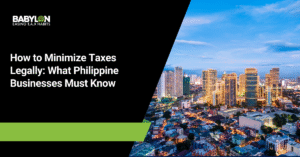In the Philippines, service charges collected by establishments such as hotels and restaurants are considered part of the cost of the food, goods, or services ordered by customers. Under Republic Act No. 11360, which amended Article 96 of the Labor Code, these charges must be fully and equally distributed among covered rank-and-file employees — excluding managerial staff.
But what about taxation? Is this amount subject to VAT? Let’s break it down.
Are Service Charges Taxable?
Yes, if the service charge is mandatory and included in the bill, it is generally considered part of the taxable gross receipts of the establishment for VAT purposes. This aligns with the principle that all amounts paid as consideration for a service, including required service charges, are subject to VAT.
When Is a Service Charge a “Pass-Through” Item?
When 100% of the service charge is distributed to employees, it’s considered a pass-through item. This means that the business is merely collecting the amount on behalf of employees. In this case, the amount does not form part of the business’s revenue.
However, to support this treatment, businesses should ensure:
- The full amount is actually distributed,
- It’s clearly recorded separately in the books, and
- There’s no retention by the establishment.
Legal Basis and Tax Implications
1. Republic Act No. 11360
This law mandates the full distribution of service charges to non-managerial employees. Its goal is to recognize the contribution of service staff by giving them a direct share of service-related earnings.
2. Tax Treatment (NIRC Section 106)
According to the National Internal Revenue Code of 1997, service charges that are required and automatically added to the bill are part of the consideration for the service. That makes them subject to VAT unless they are pass-through items (i.e., fully given to employees).
What If the Establishment Retains a Portion?
If a business retains any portion of the service charge (e.g., 1% of a 6% charge), that retained portion becomes part of the business’s revenue and is therefore subject to VAT.
This kind of retention also raises legal red flags. Under R.A. No. 11360, 100% distribution is mandatory unless there’s a specific legal exemption or compliant agreement.
Department Order No. 242-24
The implementing rules from the Department of Labor and Employment (DOLE) emphasize full distribution. Non-compliance may lead to penalties including administrative sanctions and potential monetary claims from employees.
Key Takeaways
- Fully distributed service charges are non-taxable pass-through items and not part of the business’s VAT base.
- Any retained portion is taxable revenue and may violate labor law.
- Separate recording and compliance are essential to ensure both tax and legal obligations are met.
Conclusion
Understanding the tax implications of service charges helps businesses stay compliant and protect both their finances and their workforce. When in doubt, consult with a tax professional or legal advisor to ensure your practices align with current laws.
DISCLAIMER:This article is developed by subject matter experts at Babylon2k. This is for general information only and does not constitute expert advice. It is based on current regulations and may not account for all related topics. Any tax or compliance guidance provided cannot be used to avoid penalties or promote specific actions. Laws and interpretations may change over time, which could affect the accuracy of this report. We are not obligated to update this advisory if new regulations arise.
How We Can Help
Babylon2k’s B.E.T.H. can also help you when you need more information and clarification on how this law affects your business. Learn More >
☎️ Get in Touch!
- Request a Free Consultation | Request Consult
- Message us on Viber/ Whatsapp Number @ +63-927-945-3382.
- Email us directly at [email protected]






